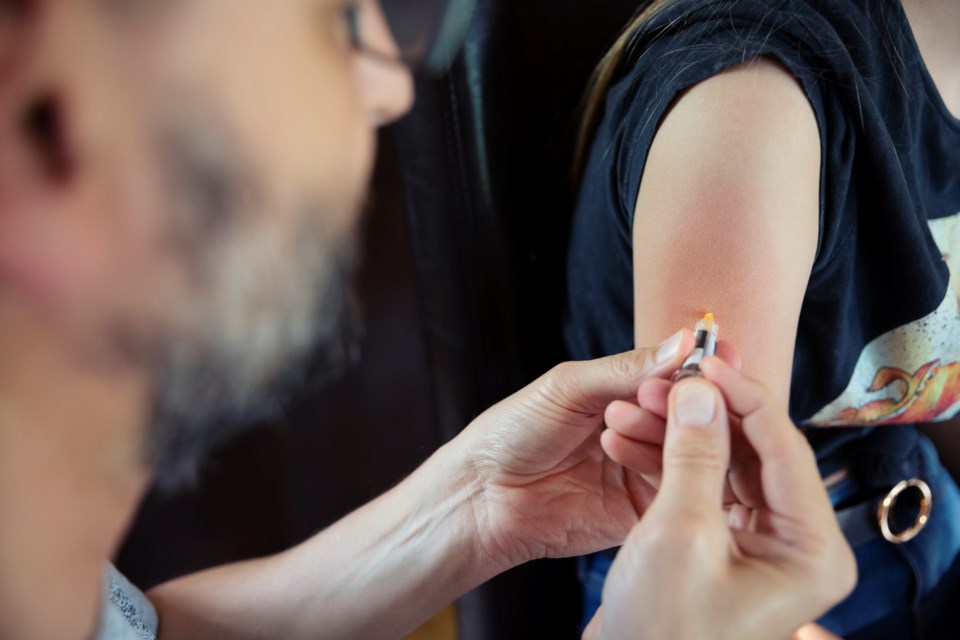Students in grades 10-12 across the province are seeing HPV vaccine clinics come to their schools.
Public health nurses with Interior Health are informing teens about human papillomavirus or HPV, then offering same-day vaccinations.
"Schools are a good place for us to reach out to a higher number of people," says Medical Health Officer Dr. Fatemeh Sabet.
One such clinic was held Monday at Clarence Fulton Secondary in Vernon.
"We are 100% in support of this," says the head of School District 22.
Supt. Christine Perkins recently attended a presentation by Dr. Penny Ballem, the premier's health advocate, addressing superintendents in the province.
Ballem explained HPV is the leading infectious cause of cancer and how vaccination protects against cervical and other types of cancers, including cancers of the mouth, throat, anus, penis, vagina and vulva, as well as, genital warts.
Perkins says they were also informed of the province’s cancer care plan which aims to increase uptake of the HPV vaccine from the current 66% to achieve the national average of 90% in the next three years.
According to Interior Health, full coverage means having two or more doses of Gardasil 9, by the age of 17.
"We will be supporting Interior Health and their roll out of protection for our young people this spring and further, into the fall," Perkins says.
Liz Peterson is a mother of six children between the ages of 13 and 21. She was vigilant with their childhood immunizations and even supported her eldest getting vaccinated against HPV.
Now, she finds herself questioning vaccines and government motives in a post COVID-19 world.
"All I think about is big pharmaceutical companies making money and not caring about the life behind it," she says.
"Mine will definitely not be getting any injections," another parent told Castanet in text messages.
At least half a dozen parents reached by Castanet expressed similar views.
Sabet is aware public vaccine hesitation is out there: “That’s why we don't offer the COVID vaccine in schools,” she says.
For school-based vaccine clinics, students are allowed to decide for themselves under what is called mature minor consent.
Sabrina Kennedy is a Grade 12 student and doesn't feel one day of information is enough for her to truly make an informed decision. "I just can't trust people putting things in my body, when I'm not nearly educated enough to know exactly what it is," she says.
According to Interior Health, the Infants Act states that children may consent to a medical treatment on their own as long as the healthcare provider is sure that the treatment is in the child's best interest, and that the child understands the details of the treatment, including risks and benefits.
While Peterson would never criticize anyone’s immunization decisions, she doesn’t think parents should be excluded from medical decisions while children are still in grade school.
"They're not adults yet, they can't vote, they can't get a tattoo," she says. "They can’t even hold their own medical care card until they are 19, so they shouldn't be allowed to make medical decisions."
Sabet says allowing minor consent is not meant to circumvent parental involvement and encourages families to research before in-school clinics are held.
Links to several websites are included in emails sent home from schools in advance of any clinic.
Perkins points to the province's current data and asks parents to consider which category they want their children to fall into: "the 66% that are fully protected from these cancers, or the rest who are not."
What Sabet wants people to understand about HPV-related cancers is that vaccine effectiveness is increased if doses are administered before anyone becomes sexually active.
"It can actually prevent 100 per cent of the cancers created by these (HPV) viruses," Sabet says.
Along with offering HPV vaccines, the school clinics will also offer a full catch-up on any vaccinations students are eligible for.
Scheduling of in-school clinics is handled by Interior Health and not the school district.



